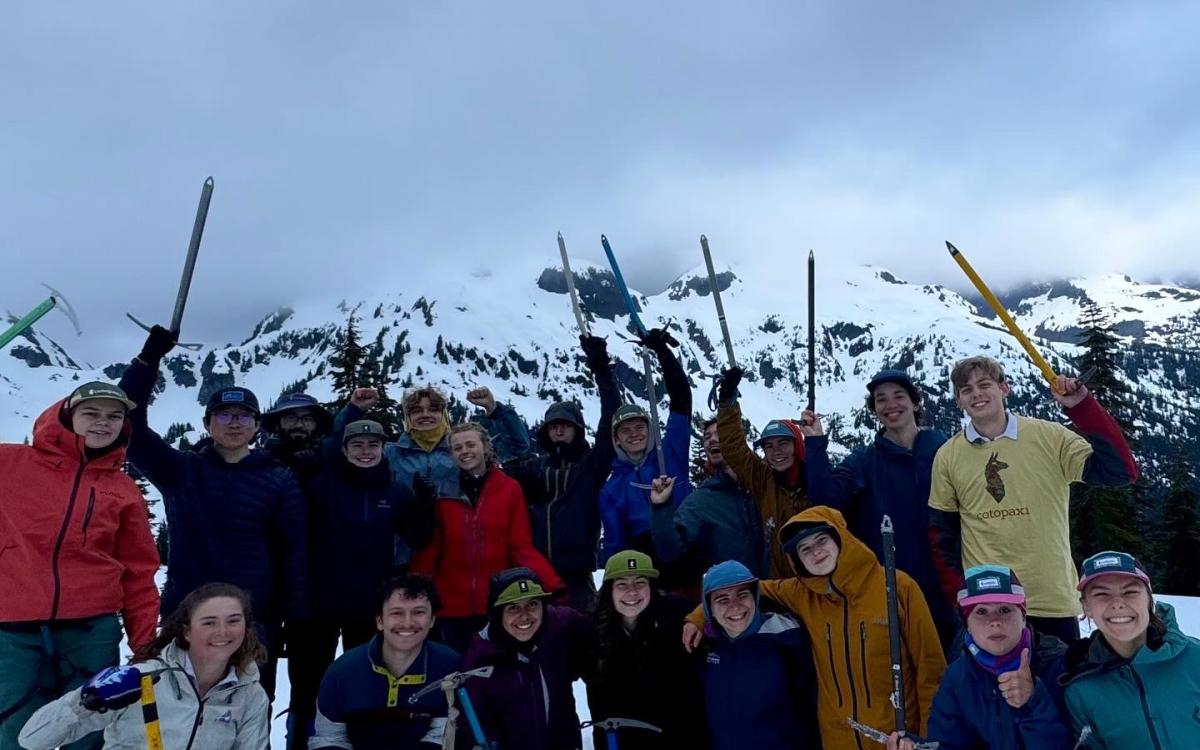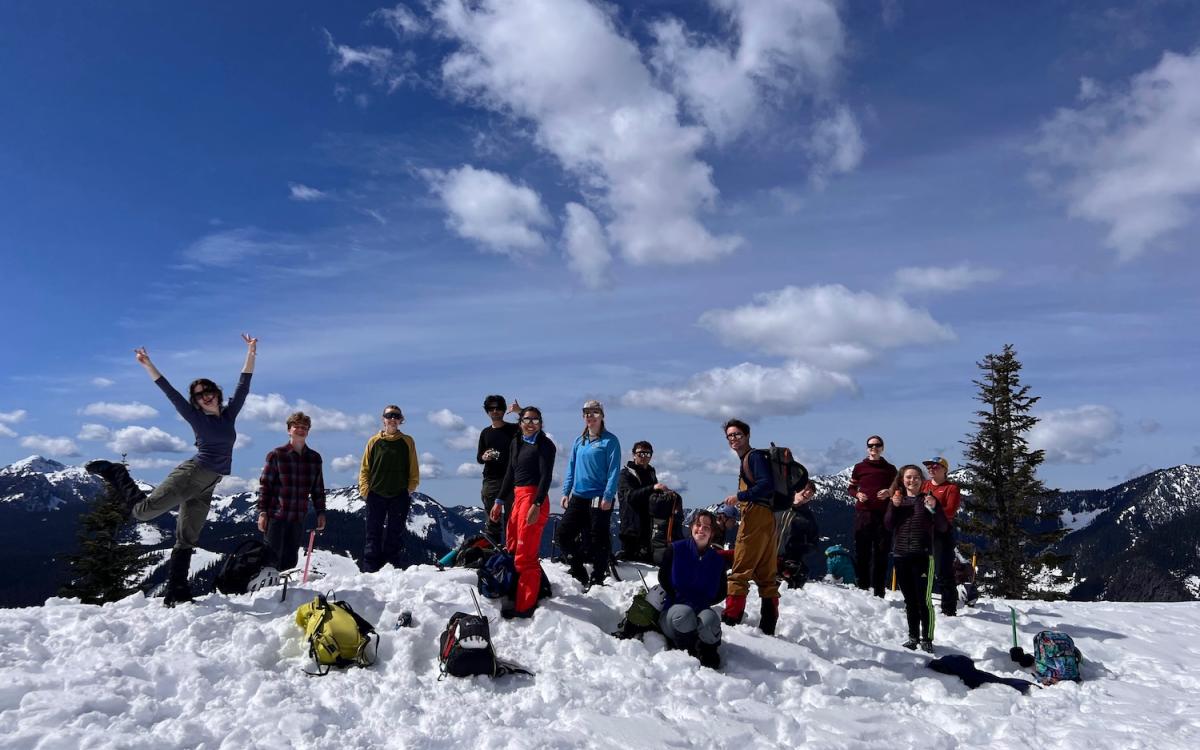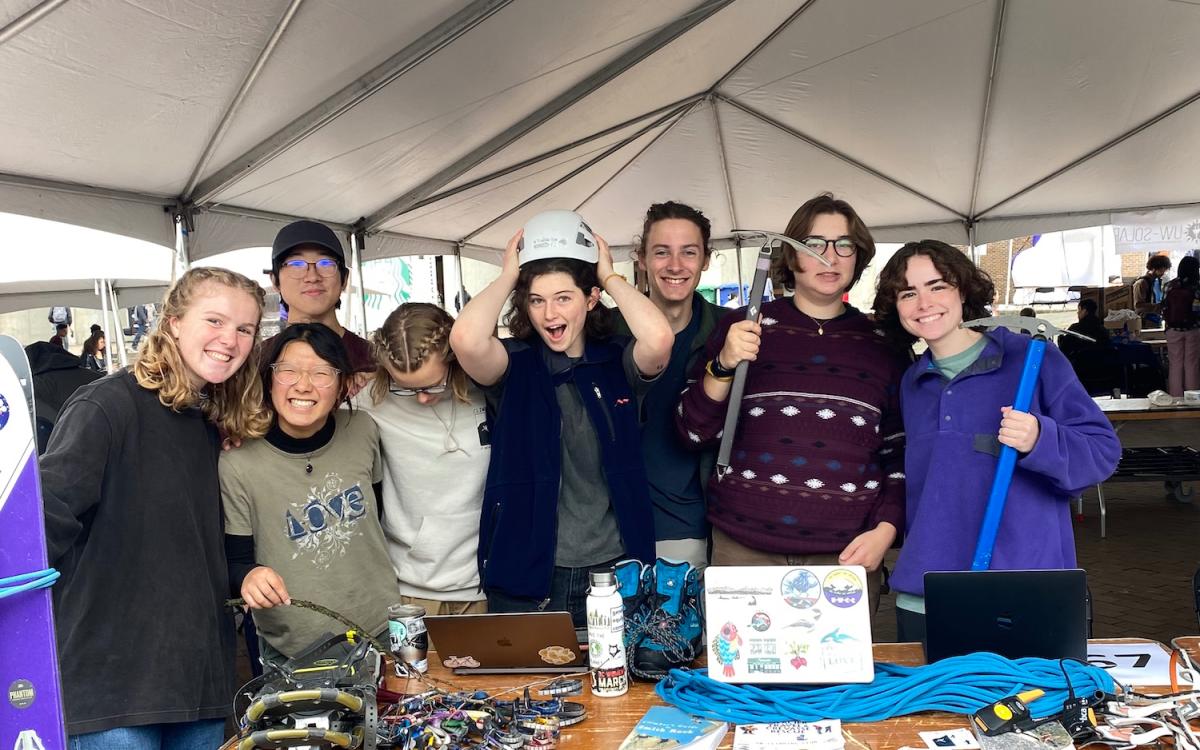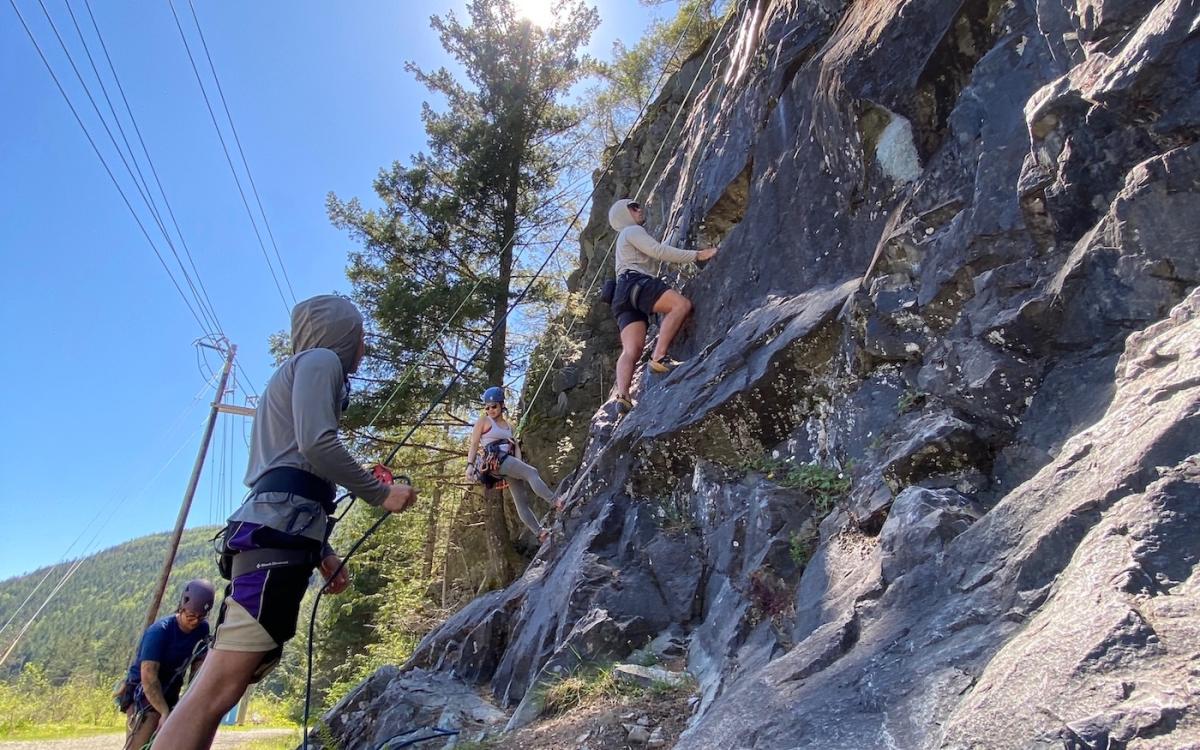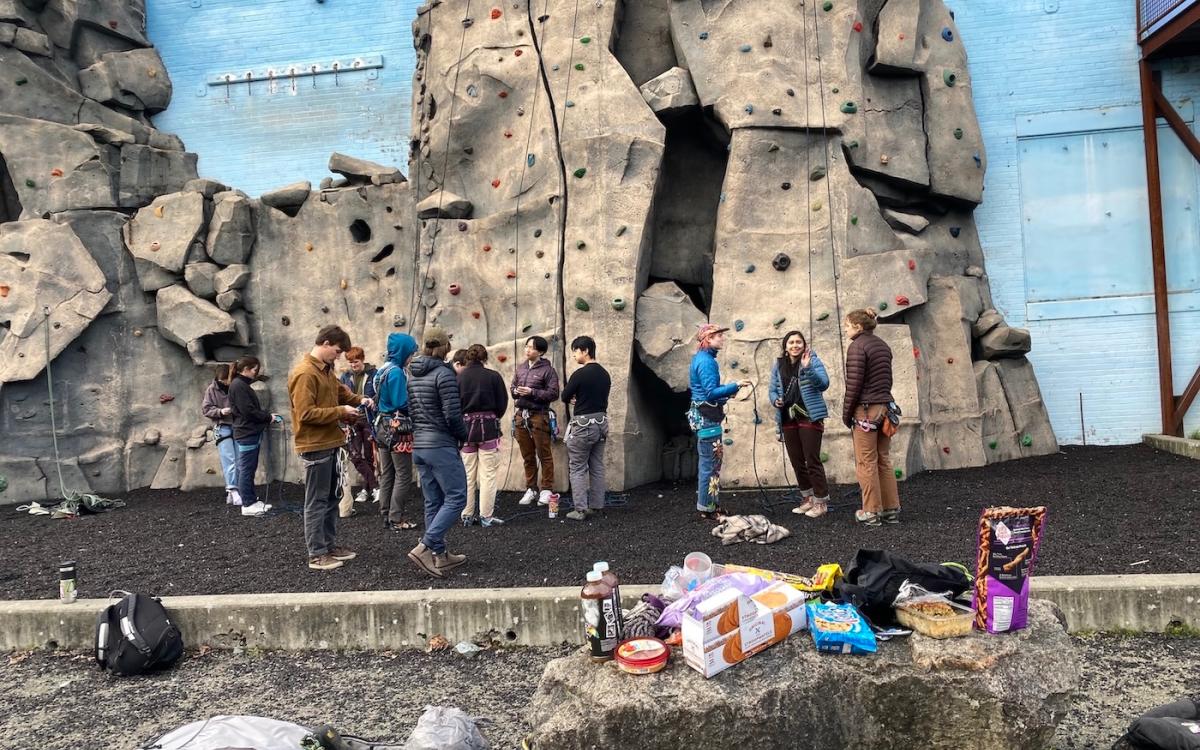At a glance
The UW Climbing Club aims to establish a scholarship program to improve accessibility to outdoor activities by covering… Read full summary
- Funding received
- 2023-2024
- Mini
- Awarded
- $5,000
- Funding partners
-
- Services and Activities Fee (SAF)
The UW Climbing Club aims to establish a scholarship program to improve accessibility to outdoor activities by covering membership fees, travel expenses, and essential gear for students facing financial barriers. Currently, the club charges a membership fee to provide gear for members, but this fee adds to the financial burden of college students. While the club’s gear-lending program helps minimize costs, it does not address all the financial challenges, such as the need for personal shoes. The CSF funding would create a dedicated pool of resources to expand the scholarship program, allowing more students, particularly those from underrepresented groups, to participate and increase equity in outdoor spaces.
We would like to set up a scholarship program that makes the club more accessible. Getting involved in the outdoors presents financial barriers because how many of these activities require a lot of expensive gear. We currently ask people to pay a membership fee to be a part of the club for the reasons being for gear to make it so that people do not have to bring or purchase ropes, helmets harnesses, and other things but instead, the club would provide people with them. This fee adds to this preexisting financial barrier, especially for college students who have other financial obligations such as rent, food, tuition, and more. However, this fee is something we rely on to be able to purchase the gear for our members to freely use once they have paid for their membership. Even though we do provide an assortment of gear we do not provide shoes since logistically it would be hard to buy enough of them based on all the different sizes available and the difficulty of figuring out what sizes would require multiple pairs, as a result of our lack of shoes members are currently required to have their own which usually can cost them upwards of $50.
Originally the club gear lend-out program has been the only way in which we try and minimize the cost of getting involved in the outdoors however, as we have examined this approach we have noticed the flaws and gaps in its ability to create accessibility. This year we have been working hard to create the club's first-ever scholarship program where students can get their membership fee waived, get gas money for our outdoor trips, and personal gear (helmet, carabiner, and shoes). As of right now, we have been using membership fees to cover the cost of our scholarship which has limited the club's ability to continue to add and replace the gear that we can lend out and use on our trips. The CSF funding would provide our club with a separate pool of money to specifically set aside for our scholarship program. We hope that this would allow us to increase the amount of people who receive the scholarship which in turn would create more equity and accessibility in the outdoors. It is very important to us that this money would lead to an increase in the representation of historically underrepresented/excluded groups in outdoor spaces.
Synnove Price-Huish
Project lead
- sunnyph@uw.edu
- Affiliation
- Student
- Years
- 2 year(s) remaining at UW
- Affiliated groups
- Climbing club RSO
Syd Field
Team member
- sydrosef@uw.edu
- Affiliation
- Student
- Years
- 1 year(s) remaining at UW
- Affiliated groups
- Climbing club RSO
Request amount and budget
Plans for financial longevity
This funding would provide access to climbing for community members, create an environment that is more inclusive of those traditionally excluded from climbing, and lower the club's entry point. This funding would provide a network of a more robust climbing community. We feel confident that this grant would help support our scholarship and lift it in the way that it requires to get it up and running effectively. As this funding diminishes we are planning on using the success of our program to reach out to Climbing Club alumni and ask for donations. By showcasing the club's progress in
creating more equity and accessibility we believe that alumni, who have grown jobs and understand the beneficial impacts of the outdoors, will be willing to donate to our scholarship program. Additionally, we fully intend to continue to apply for other grants and other types of funding. We have already been holding fundraising events, such as a bake-sale, to add to our scholarship program and we plan on continuing these efforts.
n/a
Plans for long-term project management
n/a
Problem statement
It is widely known that many University of Washington students are passionate about outdoor spaces and engage in hobbies which lead them to recreate outside. A critical aspect of our mission as a club is to enable students with resources in order to do so. Fostering an environment for students to get involved in physical activities which would otherwise be intimidating is important to our university community. On the same note, this also aids the mental health of students balancing the complexities of their workloads and hobbies.
We understand that there is a financial burden that is imposed upon students who wish to venture into these spaces. Outdoor recreation has barriers of entry that are pervasive across our community. In our unique case, gear is expensive and needs replacing. In order to ensure anyone and everyone can participate, we have a gear cache that members have access to. Though our knowledge, enthusiasm, and ingenuity take us far, our gear is the key to our ability to recreate outside. Currently, our club members must pay a fee so that we can continue to stock and maintain this equipment.
Problem context
The pervasive nature of white, patriarchal ideology in the outdoor recreation space needs to be put into question to ensure protection of and connection to the natural world, making them safe and accessible to large populations. Our club designs events with equity and inclusivity as our guiding principles. We host free affinity trips, including Queer and BIPOC Climbing Trips, led by members of those communities. We also have begun to host free climbing nights at Crags Climbing Center, providing climbing rentals and belay tests. Further, we initiated our scholarship program to grant memberships, gas money, and climbing gear for students on a need basis.
By creating modes for more people to access the outdoors, we can begin destabilizing the systems of oppression that make the climbing community only for the elite few through educating our members about Leave No Trace principles, the environment, and risk management techniques. Our team is setting precedents of mutual reciprocity and respect in outdoor spaces, with a mindset of gratitude for the beautiful environment and thinking about our community’s role as stewards of the natural world, giving back to the land that has given us so much joy.
Measure the impacts
| Impact / goal | Metric(s) of success | UW stakeholders impacted |
|---|---|---|
| Diversifying and providing accessibility to outdoor climbing spaces | # of scholarships granted | Undergraduate, Graduate, Alumni |
| Educating on recreating in outdoor spaces | # of educational events that we host | Undergraduate, Graduate, Alumni |
| Providing more gear to climbing club members to borrow for their own outdoor activities | Quantity of gear available for check-out by club members | Undergraduate, Graduate, Alumni |
Communication tactics and tools
While tabling, club staff bring out gear and information on our club to provide information and help to those who want to join our club and outdoor spaces in general but do not know where to start. We try to make our booth accessible and easy for people to get involved. We also inform students of upcoming events and explain our scholarship program, giving advice and help when needed. We also host many educational events to teach risk management practices in outdoor climbing spaces. We host these events in Seattle so members can learn from those with more climbing experience and use these events to connect with community members. Our Instagram is used to post about upcoming trips and scholarship opportunities. We use the account to answer questions, where we can reach a wider audience of
people. Finally, we use our Discord, available to anyone, to post about trips and scholarship information. We also use that platform to discuss and connect about outdoor recreation. In Particular, we have channels dedicated to the scholarship form, outdoor advice, and gear swap channels to provide resources for all community members to connect and learn about outdoor climbing.
Outreach communication plan
We will communicate our Scholarship Program to the community through tabling and social media. We will table on-campus at least twice each quarter to inform the UW community about our program and use our discord and social media to reach the public. Students and alumni will benefit from the increased access to gear and increased number of educational events that give people the ability to safely and responsibly recreate in outdoor spaces. We intend to give the most attention to traditionally marginalized communities, reaching out to cultural/identity-based RSOs to spread the word about our program.
Student involvement
The club is organized by a smaller group of students members of the club who hold the position/title of “staffer”. Being a staffer is a completely voluntary position with the responsibilities of meeting once a week to communicate club updates and plan new events and outdoor trips. The club is constantly taking on new staffers and has different means for members to get involved in this position. A huge priority when it comes to establishing the staffer group is to make sure that we create a diverse group with new perspectives. As stated this grant will help make our club more diverse and it is our hope that we are able to have staffers that are scholarship awardees to add to our dynamic problem solving and discussions.
